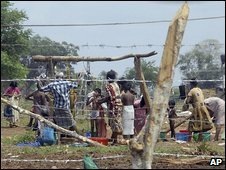 Sri Lanka needs massive international financial assistance to help tens of thousands of Tamils displaced by conflict, the defence secretary says.
Sri Lanka needs massive international financial assistance to help tens of thousands of Tamils displaced by conflict, the defence secretary says.
In a BBC interview, Gotabhaya Rajapaksa said he expected much more than had been promised by donors including the UN, the US and Japan.
The funds are needed for facilities for nearly 300,000 people currently housed in government-run camps in the north.
Sri Lanka’s government declared victory over Tamil Tiger rebels in May.
Mr Rajapaksa’s comments came as the UN and Western countries have been urging a rapid resettlement of Tamil civilians to their homes in the north of the country.
Although the government has promised to resettle most of the civilians by the end of this year, many think the target may be tough to achieve.
‘Donors’ concerns’
The government says it needs time to remove mines from war-affected areas and to root out insurgents hiding among the displaced population.
"We have told the US, Japan and others that we need more money to build infrastructure in the camps and to resettle these people," Mr Rajapaksa said in a telephone interview.
"Funding is the major bottleneck in carrying out the rehabilitation work," he said.
The UN and other international agencies have been providing relief in the camps for Tamils displaced by the war.
But long term rehabilitation needs additional resources.
Some estimates suggest that Sri Lanka requires about $2bn (£1.2bn) for long term post-war reconstruction.
The fresh appeal by Sri Lanka’s powerful defence secretary comes more than a week after the approval of a $2.6bn loan by the International Monetary Fund.
Sri Lanka had asked for the loan to weather a severe balance of payments crisis and tackle the effects of the global economic turndown.
The loan was approved despite donors’ concern about the government’s human rights record during and after the war against Tamil rebels.
Military bill
An unofficial and unverified UN estimate says more than 7,000 civilians were killed and another 13,000 injured near the end of the war.
No-one is sure how many more were killed in the last two weeks of the fighting.
The government denies responsibility for civilian deaths.
Sri Lanka’s defence budget this year reached about $1.7bn, about 4% of its gross domestic product (GDP), and there are expectations that with the end of the war, defence expenditure could be reduced to divert funds for rehabilitation work.
But the Sri Lankan defence secretary ruled out any immediate cuts in defence expenditure to fund post-war reconstruction.
"There will be automatic reduction in acquisition of arms and ammunition and that amount will be saved," Mr Rajapaksa said.
"But that will not directly benefit the Treasury.
"We have bought most of the weapons from foreign countries on a long-term credit facility. So, the amount of money going out of the country [in repaying the loans] will remain for some time."
‘Suspects escaping’
Sri Lanka bought millions of dollars worth of weapons from countries like China, Pakistan and Israel to fight the war with Tamil Tiger rebels.
Mr Rajapaksa said the government was aware that some people, mostly Tamil Tiger suspects, had escaped recently from the tightly guarded camps in the north.
"We have evidence that some people have gone to India, Singapore and to Europe," he said.
"We have taken action against those security personnel who had assisted the escape. But a majority of them have escaped on the pretext of going to hospitals."
The defence secretary said all the displaced people in camps had been registered and accounted for with the help of the International Committee of the Red Cross.
"If these people go out without our knowledge, ultimately the government is responsible," he said.
The UK government – which has committed £12.5m ($21m) in emergency aid to Sri Lanka – said camps "cannot be a long-term solution".
(For updates you can share with your friends, follow TNN on Facebook and Twitter )
